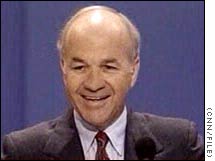 |
| Ex-Enron chairman Kenneth Lay |
|
|
|
NEW YORK (CNN/Money) -
Former Enron chairman Kenneth Lay has won an unusual court ruling as he prepares an aggressive defense ahead of his criminal trial on charges he helped bring the Houston energy giant down nearly four years ago, according to a new report.
The Houston Chronicle reports Friday that a federal judge is allowing Lay and the two ex-Enron executives due to be tried together early next year to look for documents that could show prosecutors have pressured potential witnesses not to speak to defense lawyers.
U.S. District Court Judge Sim Lake said lawyers for Lay & Co. could subpoena attorneys who represent the 15 individuals who've pleaded guilty in Enron cases in the hopes of gathering evidence showing that government tactics have silenced witnesses.
Lay, former CEO Jeffrey Skilling and former chief accountant Richard Causey are headed for trial in January 2006. They have each been accused of multiple felony counts related to the events that led to Enron's collapse in December 2001.
The court order, which legal experts described as unusual, follows some key developments in the government crackdown on corporate fraud. Former HealthSouth CEO Richard Scrushy was acquitted this week while former WorldCom CEO Bernard Ebbers and former Tyco CEO Dennis Kozlowski both face severe sentences after their recent convictions. Former Adelphia chief and founder John Rigas was sentenced last month to 15 years in prison.
Since his indictment a year ago, Lay has mounted an aggressive defense in public and in the courtroom.
The Chronicle report, however, does not say what the ramifications, if any, would be for prosecutors or the significance to Lay's defense should his lawyers uncover proof of government pressure.
Legal experts told the paper that, unlike civil cases, witnesses don't have to cooperate in criminal trials. What's more, they said it's common practice for the government to tell cooperating witnesses not to talk to defendants. And it's common practice, they said, for defense lawyers to attack the strategy used by prosecutors to make their case.
Legal experts also said that it's unlikely the subpoenas, if successful, would bear fruit. When prosecutors pressure cooperating witnesses, they don't typically leave a paper trail, the experts said. What's more, lawyers for the cooperating witnesses are likely to resist handing over any evidence to Lay et al. on the grounds that it's protected under attorney-client privilege.
Lawyers for defendants in other Enron cases have also complained that the 15 individuals who cut plea deals with prosecutors and the 100-plus individuals identified as "unindicted co-conspirators" are too afraid to speak to them.
The news article cites one witness who testified on behalf of five former colleagues at an earlier Enron trial as saying that prosecutors told him he was a target and reminded his own lawyers several times before the testimony that his client could be indicted.
To read the latest on Ebbers and other fallen executives, click here.

|